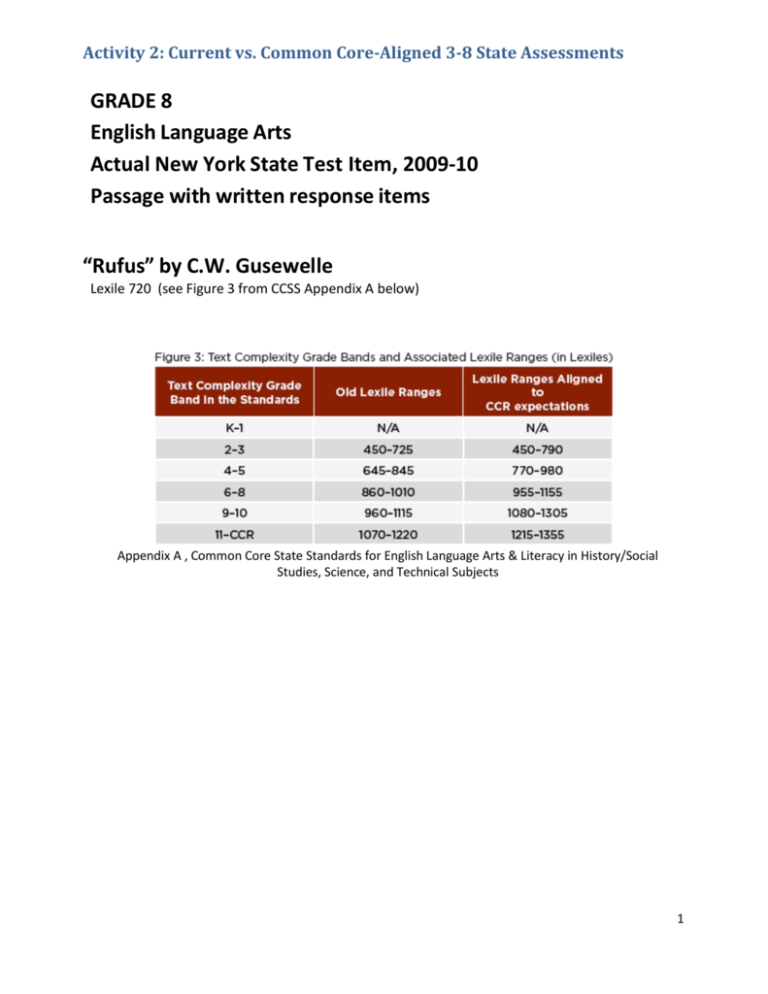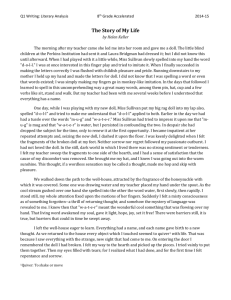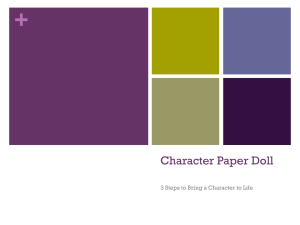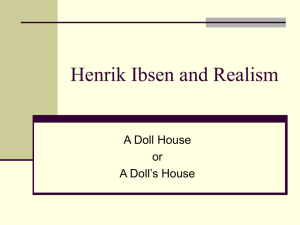Activity 2: Current vs. Common Core-Aligned 3
advertisement

Activity 2: Current vs. Common Core-Aligned 3-8 State Assessments GRADE 8 English Language Arts Actual New York State Test Item, 2009-10 Passage with written response items “Rufus” by C.W. Gusewelle Lexile 720 (see Figure 3 from CCSS Appendix A below) Appendix A , Common Core State Standards for English Language Arts & Literacy in History/Social Studies, Science, and Technical Subjects 1 Rufus by C.W. Gusewelle The bird dog is lost again. Not lost in the literal, physical sense. He’s still around, and still a friend. But I have lost him as a useful working animal, which hunting dogs are supposed to be. It happened during this summer’s spell of blistering heat when he discovered air conditioning. The bedroom has a window unit. When the awful heat came, he immediately noticed the difference between the pleasant nights in his chair and the sweltering days outside. And it occurred to him he might correct this situation. Were not the cats in there and cool? Was not the old dog snoozing in the lap of air-conditioned comfort? Then why should he, a dog of real utility, provider of fowl for the family table, not have some of this luxury? He pressed his hopeful face against the outer glass, but our hearts were hard. To present his case in a more dramatic way, he began sitting on a patio table, glaring in accusingly at eye level through a kitchen window. It yielded nothing, though. He remained outside. So he learned to open the back door. That’s right, learned to open it himself! One afternoon I looked up from my typewriter and there he was, indisputably inside, looking immensely pleased by his new competence. As far as he’s concerned, the case is closed. He’s in where it’s cool, and it’s not negotiable. He makes himself as small as possible and rarely moves. The other day Katie called him, suggesting it might be time to trot outside on a sanitary errand. He didn’t budge—just looked around the room to see if, by some coincidence, she might be speaking to another dog of the same name. So I called him, and he growled. As you probably know, the main virtue of a fine bird dog, apart from a keen nose, is unquestioning obedience. The master’s command is his highest law. Defiance is unthinkable. He is indifferent to the elements. If game is downed, he will endure any discomfort to find and bring it to hand. In a word, there is nothing a bird dog will not do for his master. Wrong! This one will not even leave his chair in an air-conditioned room. When he was chosen from his littermates several years ago, I was looking for a pup with intelligence and staying power. That’s exactly what I got. Rufus is no fool. And he’s staying cool. Book 3 2 31 In the passage “Rufus,” the author describes Rufus as having intelligence and staying power. Using details from the passage, complete the chart below with one example of Rufus’s intelligence and one example of his staying power. Quality Exhibited by Rufus Example from the Passage Intelligence Staying Power Book 3 3 32 The author of the passage says that he lost Rufus as a useful working animal during a summer heat spell. Explain why the author makes this comment about his dog. Use details from the passage to support your answer. 4 GRADE 8 English Language Arts Sample New York State Test Item, 2012-13 Passages with written response items Story of My Life by Helen Keller Lexile 980 (see Figure 3 from CCSS Appendix A below) Narrative of the Life of Frederick Douglass, an American Slave by Frederick Douglass Lexile 1000 (see Figure 3 from CCSS Appendix A below) Appendix A , Common Core State Standards for English Language Arts & Literacy in History/Social Studies, Science, and Technical Subjects 5 The materials contained herein are intended for use by New York State teachers. Permission is hereby granted to teachers and nonprofit organizations or institutions to reproduce these materials for their own use, but not for sale, provided copyright notices are retained as they appear in this publication. This permission does not apply to mass distribution of these materials, electronically or otherwise. Paired Passages Story of My Life by Helen Keller 5 10 15 20 25 30 35 The morning after my teacher came she led me into her room and gave me a doll. The little blind children at the Perkins Institution had sent it and Laura Bridgman had dressed it; but I did not know this until afterward. When I had played with it a little while, Miss Sullivan slowly spelled into my hand the word “d-o-l-l.” I was at once interested in this finger play and tried to imitate it. When I finally succeeded in making the letters correctly I was flushed with childish pleasure and pride. Running downstairs to my mother I held up my hand and made the letters for doll. I did not know that I was spelling a word or even that words existed; I was simply making my fingers go in monkey-like imitation. In the days that followed I learned to spell in this uncomprehending way a great many words, among them pin, hat, cup and a few verbs like sit, stand and walk. But my teacher had been with me several weeks before I understood that everything has a name. One day, while I was playing with my new doll, Miss Sullivan put my big rag doll into my lap also, spelled “d-o-l-l” and tried to make me understand that “d-o-l-l” applied to both. Earlier in the day we had had a tussle over the words “m-u-g” and “w-a-t-e-r.” Miss Sullivan had tried to impress it upon me that “m-u-g” is mug and that “w-a-t-e-r” is water, but I persisted in confounding the two. In despair she had dropped the subject for the time, only to renew it at the first opportunity. I became impatient at her repeated attempts and, seizing the new doll, I dashed it upon the floor. I was keenly delighted when I felt the fragments of the broken doll at my feet. Neither sorrow nor regret followed my passionate outburst. I had not loved the doll. In the still, dark world in which I lived there was no strong sentiment of tenderness. I felt my teacher sweep the fragments to one side of the hearth, and I had a sense of satisfaction that the cause of my discomfort was removed. She brought me my hat, and I knew I was going out into the warm sunshine. This thought, if a wordless sensation may be called a thought, made me hop and skip with pleasure. We walked down the path to the well-house, attracted by the fragrance of the honeysuckle with which it was covered. Someone was drawing water and my teacher placed my hand under the spout. As the cool stream gushed over one hand she spelled into the other the word water, first slowly, then rapidly. I stood still, my whole attention fixed upon the motions of her fingers. Suddenly I felt a misty consciousness as of something forgotten–a thrill of returning thought; and somehow the mystery of language was revealed to me. I knew then that “w-a-t-e-r” meant the wonderful cool something that was flowing over my hand. That living word awakened my soul, gave it light, hope, joy, set it free! There were barriers still, it is true, but barriers that could in time be swept away. I left the well-house eager to learn. Everything had a name, and each name gave birth to a new thought. As we returned to the house every object which I touched seemed to quiver with life. That was because I saw everything with the 6 40 strange, new sight that had come to me. On entering the door I remembered the doll I had broken. I felt my way to the hearth and picked up the pieces. I tried vainly to put them together. Then my eyes filled with tears; for I realized what I had done, and for the first time I felt repentance and sorrow. www.gutenberg.org 45 Words that could be defined for students are in bold. 7 Narrative of the Life of Frederick Douglass, an American Slave by Frederick Douglass I lived in Master Hugh’s family about seven years. During this time, I succeeded in learning to read and write. In accomplishing this, I was compelled to resort to various stratagems. I had no regular teacher. My mistress, who had kindly commenced to instruct me, had, in compliance with the advice and direction of her husband, not only ceased to instruct, but had set her face against my being instructed by anyone else. It is due, however, to my mistress to say of her, that she did not adopt this course of treatment immediately. She at first lacked the depravity indispensable to shutting me up in mental darkness. It was at least necessary for her to have some training in the exercise of irresponsible power, to make her equal to the task of treating me as though I were a brute. My mistress was, as I have said, a kind and tender-hearted woman; and in the simplicity of her soul she commenced, when I first went to live with her, to treat me as she supposed one human being ought to treat another. In entering upon the duties of a slaveholder, she did not seem to perceive that I sustained to her the relation of a mere chattel, and that for her to treat me as a human being was not 15 only wrong, but dangerously so. Slavery proved as injurious to her as it did to me. When I went there, she was a pious, warm, and tender-hearted woman. There was no sorrow or suffering for which she had not a tear. She had bread for the hungry, clothes for the naked, and comfort for every mourner that came within her reach. Slavery soon proved its ability to divest her of these heavenly qualities. Under its 20 influence, the tender heart became stone, and the lamblike disposition gave way to one of tiger-like fierceness. The first step in her downward course was in her ceasing to instruct me. She now commenced to practice her husband’s precepts. She finally became even more violent in her opposition than her husband himself. She was not satisfied with simply doing as well as he had commanded; she seemed 25 anxious to do better. Nothing seemed to make her more angry than to see me with a newspaper. She seemed to think that here lay the danger. I have had her rush at me with a face made all up of fury, and snatch from me a newspaper, in a manner that fully revealed her apprehension. She was an apt woman; and a little experience soon demonstrated, to her satisfaction, that education and slavery were incompatible 30 with each other. From this time I was most narrowly watched. If I was in a separate room any considerable length of time, I was sure to be suspected of having a book, and was at once called to give an account of myself. All this, however, was too late. The first step had been taken. Mistress, in teaching me the alphabet, had given me the inch, and no 35 precaution could prevent me from taking the ell. The plan which I adopted, and the one by which I was most successful, was that of making friends of all the little white boys whom I met in the street. As many of these as I could, I converted into teachers. With their kindly aid, obtained at different times and in different places, I finally succeeded in learning to read. When I 40 was sent of errands, I always took my book with me, and by doing one part of my errand quickly, I found time to get a lesson before my return. I used also to carry bread with me, enough of which was always in the house, and to which I was always welcome; for I was much better off in this regard than many of the poor white children in our neighborhood. This bread I used to bestow upon the hungry little 45 urchins, who, in return, would give me that more 8 bread of knowledge. I am strongly tempted to give the names of two or three of those little boys, as a testimonial of the gratitude and affection I bear them; but prudence forbids;—not that it would injure me, but it might embarrass them; for it is almost an unpardonable offence to teach slaves to read in this Christian country. It is enough 50 to say of the dear little fellows, that they lived on Philpot Street, very near Durgin and Bailey’s ship-yard. I used to talk this matter of slavery over with them. I would sometimes say to them, I wished I could be as free as they would be when they got to be men. “You will be free as soon as you are twenty-one, but I am a slave for life! Have not I as good a right to be free as you have?” These words used to trouble 55 them; they would express for me the liveliest sympathy, and console me with the hope that something would occur by which I might be free. www.gutenberg.org Words that may be defined for students are in bold. Short Answer Constructed Response Questions for “The Story of My Life” Closely reread the following sentences from lines 37–39 of the passage: “Everything had a name, and each name gave birth to a new thought. As we returned to the house every object which I touched seemed to quiver with life.” 1. How do these sentences reflect the author’s changing relationship with language? Use two details from the passage to support your answer. Write your answer in complete sentences. _______________________________________________________________________________________________________ _______________________________________________________________________________________________________ _______________________________________________________________________________________________________ _______________________________________________________________________________________________________ _______________________________________________________________________________________________________ _______________________________________________________________________________________________________ Aligned CCLS: RI.8.2 Commentary: This item aligns to CCLS RI.8.2 because it asks students to analyze how a particular incident reveals an aspect of the author. Rationale: The response accurately describes how the author’s newfound relationship to words (that objects now “quiver with life”), brought on by her experience with touching water, is different from her initial experiences with words. (The correct response can include either the initial experience with the word “doll” or the later initial experience with “mug” and “water.”) 9 2. Describe how the author’s attitude toward the doll symbolizes her changing attitude toward learning words throughout the story. Use two details from the passage to support your answer. Write your answer in complete sentences. _______________________________________________________________________________________________________ _______________________________________________________________________________________________________ _______________________________________________________________________________________________________ _______________________________________________________________________________________________________ _______________________________________________________________________________________________________ _______________________________________________________________________________________________________ Aligned CCLS: RI.8.2 Commentary: This item is aligned to CCLS RI.8.2 because it asks students to think about how the doll illustrates, or symbolizes, the author’s changing attitude toward language, a central idea of the text. Rationale: The response accurately describes the author’s initial connection of words with the doll (“Running downstairs to my mother I held up my hand and made the letters for doll. I did not know that I was spelling a word or even that words existed”), then how she connects her frustration with learning words to the doll (“I became impatient at her repeated attempts”) and (“seizing the new doll, I dashed it upon the floor”), and finally her exhilaration and eagerness to learn new words (“That living word awakened my soul”) and how her newfound skill causes her to have new feelings about the doll (“for the first time I felt repentance and sorrow”). 10 Short Answer Constructed Response Questions for “Narrative of the Life …” 1. Describe Master Hugh’s wife’s changing attitudes toward the author. Use two details from the passage to support your answer. Write your answer in complete sentences. _______________________________________________________________________________________________________ _______________________________________________________________________________________________________ _______________________________________________________________________________________________________ _______________________________________________________________________________________________________ _______________________________________________________________________________________________________ _______________________________________________________________________________________________________ Aligned CCLS: RI.8.2. Commentary: This item aligns to CCLS RI.8.2 because it asks students to analyze the development of a central idea. Rationale: The response accurately explains that Master Hugh’s wife initially is friendly and kind to the author, even teaching him how to read (“My mistress was, as I have said, a kind and tender-hearted woman …”). The response goes on to describe a change in Master Hugh’s wife’s attitude toward the author (“Slavery soon proved its ability to divest her of these … qualities. Under its influence, the tender heart became stone …). 2. Explain how the author’s relationship with the boys in the neighborhood is different from his relationship with Master Hugh’s wife. Use two details from the passage to support your answer. Write your answer in complete sentences. _______________________________________________________________________________________________________ _______________________________________________________________________________________________________ _______________________________________________________________________________________________________ _______________________________________________________________________________________________________ _______________________________________________________________________________________________________ _______________________________________________________________________________________________________ Aligned CCLS: RI.8.1; additional standards may be added after further development. Commentary: This item aligns to CCLS RI.8.1 because it asks students to analyze what the text says explicitly. Rationale: The response accurately explains that the author’s relationship with the boys is one of kindness and mutual respect (“These words used to trouble them; they would express for me the liveliest sympathy”) and that the author’s relationship with Master Hugh’s wife is one of meanness and disrespect (“She finally became even more violent in her opposition… I have had her rush at me with a face made all up of fury… apprehension”). 11 Extended Constructed Response Paired Passages In the two autobiographies, the authors describe the challenges they must overcome to learn essential skills. Using specific details from the two passages, compare and contrast the challenges that each author faces and how each addresses those challenges. In your response, be sure to do the following: describe the challenge presented in “Story of My Life” describe the challenge presented in “Narrative of the Life of Frederick Douglass, an American Slave” explain how the author of each passage addresses the challenge compare and contrast the challenges the authors faced and how they overcame their challenge use details from both passages in your response Write your answer in complete sentences. ___________________________________________________________________________________________________________ ___________________________________________________________________________________________________________ ___________________________________________________________________________________________________________ ___________________________________________________________________________________________________________ ___________________________________________________________________________________________________________ ___________________________________________________________________________________________________________ ___________________________________________________________________________________________________________ ___________________________________________________________________________________________________________ Aligned CCLS: RI.8.2, W.8.2, W.8.9 Commentary: This item aligns to RI.8.2, W.8.2, and W.8.9 because it asks students to determine the main theme in each passage, and then select evidence from the passages to support written analysis. Rationale: The response thoroughly and accurately describes the challenge presented in each passage: in the first passage the author is deaf and blind and so must learn to read through a special sign language; and in the second passage the author is a slave who must find a way to learn how to read when his mistress tries to prevent him from learning. The response further describes the impediments to learning that each author encounters and their respective ways of overcoming those impediments: the author of the first passage cannot initially grasp what words are but eventually learns, through the persistence of her teacher, how to experience words and their meanings in a concrete way; and the author of the second passage must overcome the hostilities of Master Hugh’s wife and seek help from the boys in the neighborhood, who are kind enough to teach him how to read. 12








